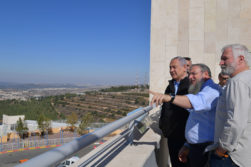The Trump Administration announced a change in the American perspective on the legality of Israeli settlements in Judea and Samaria on Monday, reversing the position of the Obama Administration that had called the civilian communities illegal. “The establishment of Israeli civilian settlements in the West Bank is not per se inconsistent with international law,” United States Secretary of State Mike Pompeo told reporters.
“…We believe that what we’ve done today is we have recognized the reality on the ground… and we have provided… the very space for Israel and the Palestinians to come together to find a political solution to this very, very vexing problem.”
Pompeo, whose comments were published by the State Department, made it clear the US was not commenting on the legality of specific settlements, noting Israel’s court system has repeatedly addressed that issue. For the US, the control of territory in the Biblical heartland—claimed by the Palestinians in what they call the West Bank—is a matter for peace negotiations between the sides.
Israeli Prime Minister Benjamin Netanyahu celebrated the move. “This policy reflects an historical truth—that the Jewish people are not foreign colonialists in Judea and Samaria. In fact, we are called Jews because we are the people of Judea.”
In addition to the history, Netanyahu agreed with Pompeo that the US decision can positively impact the Middle East peace process.
“The Trump Administration policy is also correct in stating that those who have categorically denied any legal basis for the settlements not only deny truth, history and the reality on the ground, they also set back the cause of peace, which can only be achieved through direct negotiations between the parties,” said Netanyahu on Monday in comments released by his office.
“…Israel remains ready and willing to conduct peace negotiations with the Palestinians regarding all final status issues in an effort to achieve a durable peace but will continue to reject all arguments regarding the illegality of the settlements.”
Israel captured the territory from Jordan in the 1967 defensive war that saw Israel also retake eastern Jerusalem. Since then, hundreds of thousands of Israelis have moved into Judea and Samaria, building communities in Biblical locations such as Hebron and Beit El. The Palestinians have claimed that the dwellings are illegal since they accuse Israel of occupying their territory.
Citing a somewhat fluid approach on the issue by the various United States presidential administrations over the last four decades, Pompeo said the Trump Administration agreed with former President Ronald Reagan’s view on the legality of the settlements.
“Subsequent administrations recognized that unrestrained settlement activity could be an obstacle to peace, but they wisely and prudently recognized that dwelling on legal positions didn’t advance peace,” said Pompeo, criticizing the government of Barack Obama for “publicly reaffirming the supposed illegality of settlements.”
“Calling the establishment of civilian settlements inconsistent with international law hasn’t worked. It hasn’t advanced the cause of peace,” said Pompeo.
“The hard truth is there will never be a judicial resolution to the conflict, and arguments about who is right and wrong as a matter of international law will not bring peace. This is a complex political problem that can only be solved by negotiations between the Israelis and the Palestinians.”
Netanyahu said the US decision “rights a historical wrong.”
Said the Israeli premier, “Israel’s legal system, which has proven itself fully capable of addressing legal questions related to the settlements, is the appropriate place for these matters to be adjudicated—not biased international forums that pay no attention to history or facts.
“…[Israel] calls upon all responsible countries who hope to advance peace to adopt a similar position.”
(By Joshua Spurlock, www.themideastupdate.com, November 19, 2019)

